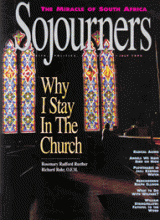The day after Richard Nixons funeral, The New York Times editorialized that the White House-sponsored occasion was a "rite of reconciliation" that brought "to a fitting end his 20-year struggle to rehabilitate himself." Nixons eulogists went well beyond the civilities of final respects; those who came to bury Nixon praised him as well, calling him statesman, diplomat, and even hero.
The posthumous rehabilitators of Richard Nixon cast his regime as a flawed but ultimately triumphant presidency, touting in particular his foreign policy expertise, especially the reopening of China to the West. President Clinton urged the nation not to judge Nixon "on anything less than his entire life and career."
So what picture emerges from the totality of Nixons public life? The crux of his foreign policy was not China but Vietnam, where his legacy includes 21,000 names on the Vietnam memorial wallas well as half a million additional Vietnamese deathswhile his "secret plan" stretched into five more years of war, distinguished by one of the most massive saturation bombing campaigns in history. His secretand illegalexpansion of the war into neighboring Cambodia led to the deaths of hundreds of thousands of Cambodians and resulted in the ascension of one of the centurys bloodiest despots, Pol Pot.
Read the Full Article
